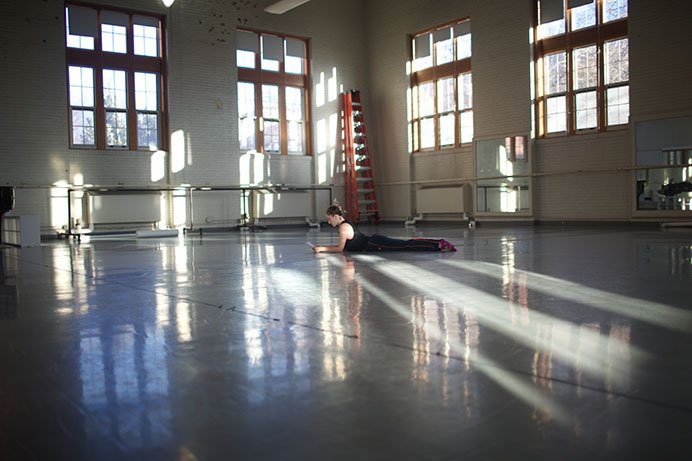By Claire Dietz
What do John Updike and Shel Silverstein’s Where the Sidewalk Ends have in common? For M.F.A. dance student Autumn Eckman, the answer is more obvious than what meets the eye and can only be found by uncovering, and contemplating, the meaning of closure.
Eckman and fellow M.F.A. dance student Ramon Flowers will perform their M.F.A. theses beginning today at 8 p.m. in Space/Place.
Eckman’s piece, “In Closure,” deals with endings, whether they be the ending of the world, our lives, the universe, or simply an experience.
Through choreographing a piece centered on endings and their exploration, her own perspective on the topics have shifted.
“I think as humans, we ultimately seek closure,” she said. “I’ve begun to look at it more through a poetic perspective of seeking closure.”
She found herself drawing primarily from children’s literature, which stayed with her for years after she had read the final page. One particularly influential was Shel Silverstein’s Where the Sidewalk Ends.
The book, written in 1974 by the great children’s author and poet Silverstein, addresses childhood worries and concerns and contains fantastic stories that would not be out of place in a child’s own imagination.
“It’s funny how things stick with you,” Eckman said. “There’s so many things in popular culture and children’s literature geared toward this.”
When she began staging this piece about endings, children’s literature and childhood seemed to be a natural next step. She noed that the piece about life and childhood does not discuss the idea of mortality until much later.
More than anything, though, Eckman wanted to stage the work as a piece of writing in the process of auto-composition, a metaphor for how we write our own lives, construct our own plots.
“I wanted to blur those lines and see how endings connect,” she said.
“They do in real life, [and] endings spawn new beginnings.”
Eckman’s work will be presented alongside that of co-performer Flowers. Flowers’s piece, “Raisin in the Milk: A Double
Consciousness,” deals with the “nature of racism in this country” and the role it plays in American ballet.
The starting point for Flowers’ thesis was Brenda Dixon-Gottschild’s documenting of the Africanist presence in some areas of mainstream ballet. It will also focus on the African diaspora, “which had an influence on the founding father of American ballet, George Balanchine.”
According to the program description, “Ramon is interested in examining racial stereotyping and appropriation as some of the causes of what W.E.B. DuBois has called ‘double consciousness’ and their impact on the ‘Black Dancing Body.’ ”
“His research will examine the struggle for black dancers of unifying different components of their composite identity,” it continues. “And how this process plays out phenomenologically. In his process, he seeks a better understanding of the mechanics and cultural politics of ‘appropriation’ and its implications for understanding how racism works and is disseminated on artistic and aesthetic grounds.”
Eckman/Flowers M.F.A. Dance Thesis Concert
When: 8 pm. today, Friday, & Saturday
Where: Space/Place
Admission: $8-$14, free for UI students



